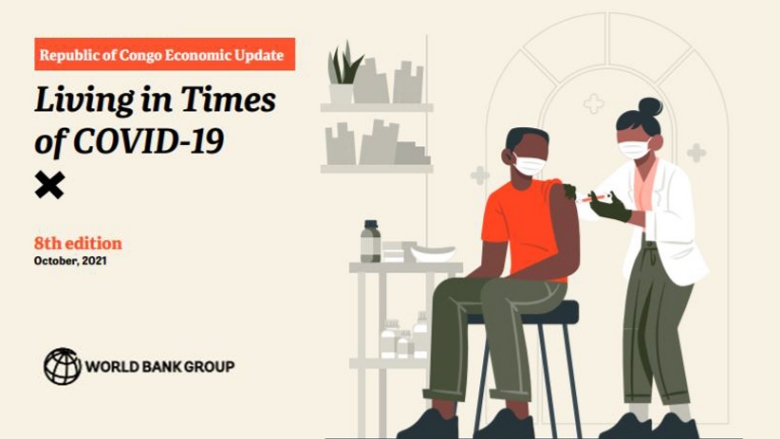BRAZZAVILLE, Republic of Congo, November 1, 2021. Whereas pre-pandemic forecasts anticipated a 4.6% growth rate, the Congolese economy is estimated to have contracted by 7.9% in 2020. This weak performance may be explained by the fact that the effects of the pandemic have exacerbated an already fragile Congolese economy. These are the conclusions of the latest World Bank report on the economic outlook for the Republic of Congo, which also reveals that the oil and non-oil sectors contracted by 7.7% and 8.3%, respectively, over the same period.
The update on the economic and financial situation in the Republic of Congo is entitled: Living in times of Covid-19. It notes that despite the prevailing budgetary constraints, Congolese authorities and the Central Bank have taken measures to mitigate the effect of the pandemic, with the support of the international community.
On the fiscal front, the government adopted a number of measures to ease tax and duty payments for private enterprises. In June 2020, the Republic of Congo mobilized US$50 million from the World Bank to provide emergency income support to households, including one-off unconditional cash transfers of CFAF 50,000 (US$82) to 231,546 households in urban areas.
Despite this support, the COVID-19 High Frequency Phone Survey (HFPS) reveals that economic damage suffered by households and enterprises has been severe:
- About 82% of households experienced a decrease in income from labor or other income-generating activities in August 2020, compared to the pre-pandemic period.
- One half of households with school-age children were not engaged in any learning activities during/from April to October, when schools were closed.
- Most companies experienced a decrease in sales revenue from August to December, and compared to the pre-crisis period, 69% of firms across the country reported a lower turnover rate.
- Compared to the first quarter of 2020, when only 5% of businesses were not in operation, an additional 23% closed temporarily or permanently in the second quarter.
With the impact of the pandemic, real GDP per capita fell by 10.3% in 2020, raising poverty rates by four percentage points in just one year, from 48.5% to 52.5% in 2020, plunging an additional 290,000 people into extreme poverty.
The Congolese economy is projected to contract by 1.2% in 2021, driven primarily by a contraction of 1.8% in the hydrocarbons sector. The non-oil sector remains fragile and is likely to contract by 0.5%. Economic activity should gradually rebound in 2022-2023, with GDP growth averaging 3.1% thanks to a more dynamic oil sector and a gradual recovery of the non-oil sector.
While the Republic of Congo remains in debt distress because of outstanding domestic and external arrears, recent debt restructuring agreements, higher oil prices, and improved debt management are putting the country back on the path of debt sustainability. The poverty rate is expected to rise to 53.3% in 2021–23. Assuming the economy grows by an annual average of 5% starting in 2024, GDP per capita will only return to pre-COVID-19 levels by 2028 and will remain below the 2014 level. At the same time, the poverty rate is projected to return to pre-pandemic levels by 2026. The outlook is subject to downside and upside risks.
Finally, the report recommends policy priorities that should be implemented in the short term, to ensure a sustainable economic recovery. The Republic of Congo would benefit from a strengthened health care system and enhanced food security for its most vulnerable population. It will also be key to diversify the economy and restore and maintain both fiscal and debt sustainability. To undertake these measures, a solid system of data collection will have to be developed, in order to more effectively guide the development of public policies.
